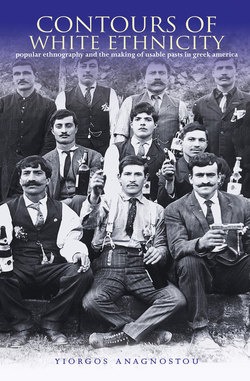Читать книгу Contours of White Ethnicity - Yiorgos Anagnostou - Страница 8
На сайте Литреса книга снята с продажи.
ОглавлениеACKNOWLEDGMENTS
Books bear countless imprints of those critical communities and institutions that contribute to their making. This book is no exception. It is animated by the eddies and currents of intellectual and material sustenance that I have received throughout years of teaching and writing in my intellectual home, the Modern Greek Studies Program at the Ohio State University. I have been fortunate to find myself in the company of scholars who encouraged the kind of critical scholarship that drives this work. I am indebted to Gregory Jusdanis for stressing the importance of interventionist scholarship, and of academic prose unencumbered by jargon. I am equally indebted to Vassilis Lambropoulos for teaching me the meaning of scholarly commitment and for nurturing critical inquiry and interdisciplinary research. With boundless generosity Artemis Leontis created environments for intellectual exchange beyond the classroom. I am grateful to her for taking the time to read my manuscript numerous times, gently encouraging me to keep asking better questions.
The writing of this book has been made possible by the material and intellectual support that I have received from various academic institutions. I express my appreciation to the College of Humanities of the Ohio State University for granting me generous research leaves that helped formulate my ideas and bring this book into fruition. A Stanley J. Seeger Visiting Research Fellowship in Hellenic Studies (fall 2005) made available crucial time for uninterrupted thinking and writing. I thank Dimitri Gondicas, the affiliated faculty, and the staff at the Program in Hellenic Studies at Princeton University for their warm hospitality and for offering a critical forum for the discussion of my ideas. I have also benefited from invitations to present my work in modern Greek programs at Columbia University, San Francisco State University, Yale University, and the Center for Folklore Studies at the Ohio State University. I thank both my hosts and the audiences for engaging with and providing insights on my work. All along, my home Department of Greek and Latin has been supportive of research on modern Greece and its diaspora. I would like to express my appreciation particularly to the chairs, David Hahm and Fritz Graf, for their guidance and unflagging backing. To all those institutions and individuals I extend my gratitude for encouraging an interdisciplinary research project whose aim has been to interrogate disciplinary assumptions and practices.
Numerous individuals lightened the arduous process of writing with their friendship and intellectual presence. Since my graduate years, Martha Klironomos has been a constant source of support and a reminder that along with an unwavering commitment to research, one must have an uncompromising dedication to teaching. I cannot thank her enough for the advice she has given me about how to manage this dual investment. I have greatly benefited from the analytical acumen of Eric Ball and Anthony Kaldellis, who have been tireless in supporting my work. They have provided the critical ear that listens well, leaving no premise and no assumption unexamined. What an invaluable intellectual companionship they have offered! In addition to offering his editorial expertise, Gerasimus Katsan was the one to supply a cheerful outlook when difficulties cast a heavy weight on my shoulders. From far away, Vangelis Calotychos, Stathis Gourgouris, Yiorgos Kalogeras, Smaro Kamboureli, Neni Panourgiá, Penelope Papailias, David Sutton, and Bonnie Urciuoli all crucially contributed through their intellectual support, their conversations, and their work. They have served as an inspiring compass to critically navigate the territory of ethnicity and ethnography. From the start, my editor Gill Berchowitz exhibited an unwavering faith in this project. I express my profound appreciation for her crucial support in critical times of its development. I am also thankful to Rick Huard, whose editorial assistance greatly contributed to the improvement of this work. Last, but not least, I thank the unsung heroes of academic life, the administrative associates. I cannot thank enough the late Mary Cole, as well as Suzanne Childs and Wayne Lovely, for creatively solving all kinds of problems and for creating a welcoming sense of home away from home.
I am devastated that my mother is no longer with us to see this book come to fruition. The fact that I cannot share the joy with her, the person to whom I owe the strength to persevere in the face of extreme adversities, weighs unbearably upon me.
With Ana, we have journeyed the last twenty-three years along contours that have been hospitable to all kinds of differences and yet familiar with the commonalities that inhabit the spaces of the margins. I couldn’t have written this book without her—she was always near, even when geography kept us apart.
PARTS of this book were published in early versions as follows: “Metaethnography in the Age of ‘Popular Folklore,’” Journal of American Folklore 119, no. 474 (2006): 381–412; “Forget the Past, Remember the Ancestors! Modernity, ‘Whiteness,’ American Hellenism, and the Politics of Memory in Early Greek America,” Journal of Modern Greek Studies 21, no. 1 (2004): 25–71; and “Model Americans, Quintessential Greeks: Ethnic Success and Assimilation in Diaspora,” Diaspora: A Journal of Transnational Studies 12, no. 3 (2003): 279–327.
